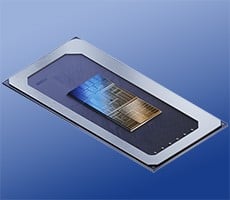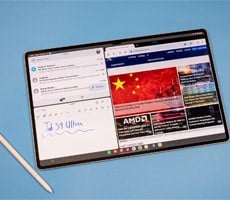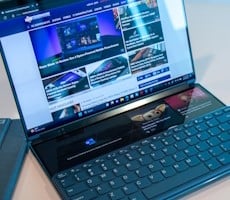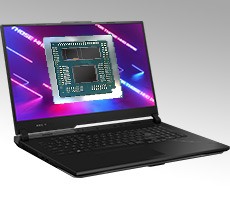Pixel 8 And Pixel 8 Pro Review: Artificially Intelligent, Naturally Elegant
Google Pixel 8 and 8 Pro Voice and Data
We tested the Pixel 8 and Pixel 8 Pro on T-Mobile's 5G network. The Pixel 8 only connects to sub 6GHz networks, but the Pro adds support for millimeter wave. These networks are faster but have limited coverage. We mostly picked up T-Mobile's Ultra Capacity signals, which run on the old Sprint frequencies. The Pixels have been good at holding a signal, and data speeds are right where we expected.Phone calls are clear, stable, and no one on the other end had trouble hearing us. Google has audio processing features to clean up call audio, so this isn't a surprise. Pixels are great at phone calls, and not just for this reason. There's also Call Screen, Hold For Me, and the rest of Google's AI-powered calling features. Call Screen alone can be life changing in this era of constant spam calls. Switching to another phone feels like a downgrade if you have to spend any amount of time on voice calls.
Google Pixel 8 and 8 Pro Performance Testing
The Tensor G3 moves to an odd nine-core design with one high-speed Cortex X3, four Cortex A715 performance cores, and four Cortex A510 efficiency cores. On the GPU side, Tensor G3 sports a Mali G715. The hardware is more than capable, but Google's Tensor chips have never topped the benchmarks. That continues to be true—the latest Snapdragon chips hit higher peak performance. However, the Tensor G3 holds its own, and its thermal performance is better than what we've seen from several Snapdragon phones.Google Pixel 8 and 8 Pro Geekbench Results
Geekbench 5 is a cross-platform benchmark that simulates real-world processing workloads in image processing and particle physics calculation scenarios. We tested all of the smartphones featured here with Geekbench's single and multi-core workloads.Geekbench is not always a particularly informative benchmark, as it's completely synthetic, and OEMs are known to optimize for it. Regardless, Geekbench can be useful as a relative data point. The Pixel 8 and 8 Pro fall about where we expected, trading blows with Qualcomm-based phones from a year ago.
Recently, the Geekbench test has been upgraded to version 6, which has new ways of testing multicore configurations and uses higher-resolution diagnostic assets. Since this benchmark is brand new, we don't have as many data points. The Pixels fair a little better here, getting close to Samsung's latest Qualcomm-based phones.
Google Pixel 8 and 8 Pro PCMark For Android Results
UL's PCMark for Android is an excellent suite of tests if you want to benchmark a wide range of tasks on a handset -- things like image and video editing, as well as lighter-duty, everyday workloads such as email and web browsing. When you see the test running live, it's clear the scripted application tests are carefully selected and tuned to make use of the mobile platform in a very controlled way. Here's where the Pixel 8 and 8 Pro fall.There's no appreciable difference in PCMark for the Pixel 8 and 8 Pro compared to last year's phones. In fact, all Pixels trail the pack in this test.
Google Pixel 8 and 8 Pro AnTuTu 8 Benchmarks
AnTuTu’s latest benchmark returns a number of metrics ranked with somewhat nebulous scores, rather than frame rates or time to complete. Here we're running the latest version of AnTuTu across multiple Android devices. AnTuTu returns four top level performance results which are all included here: CPU, RAM, 3D, UX (or User Experience), along with a total score.The Pixel 8 and 8 Pro do quite well in AnTuTu. They beat recent devices like the Nothing Phone 2 and Z Flip 5, getting close to the leading Asus ROG Phone 7. As for AI testing, well, it's not as good.
Device makers only started emphasizing AI performance a few years ago, but already we're seeing substantial year-over-year improvements. Tensor chips have never done well in general AI benchmarks, presumably because Google optimizes for its custom ML features. Don't put too much stock in this test.
Google Pixel 8 and 8 Pro Graphics And Gaming Benchmarks Results
Now, let's take a look at how the Pixel 8 and 8 pro stack up in GFXBench, which has been one of the standard mobile graphics/gaming performance benchmarks for years. To ensure that display refresh (v-sync) and resolution aren't limiting factors, we're comparing off-screen test results here. GFXBench tests OpenGL ES graphics workloads and we're specifically testing OpenGL ES 2.0 and 3.0, as well as Vulkan in the latest iterations.The Pixels do show a small gain over last year's models, putting them within striking distance of some Qualcomm-based phones. However, gaming will still be a bit worse on Google's phones.
Pixel 8 and 8 Pro 3DMark Slingshot Tests
UL's 3DMark Sling Shot is one of several modules in the 3DMark mobile suite. Unlike previous gen 3DMark mobile tests, Sling Shot is a much more advanced OpenGL ES 3.1 and Metal API-based benchmark that employs more advanced rendering techniques, like volumetric lighting, particle illumination, multiple render targets, instanced rendering, uniform buffers, and transform feedback. We're running this test in off-screen mode once again to remove display resolution differences from the equation. This allows us to compare cross-platform results more reliably.Again, Google's Tensor chip is in the middle of the pack in this test. As long as you're not demanding perfect performance in heavy games like Genshin Impact or Civ VI, you should be happy with the Pixel 8 and 8 pro.
Pixel 8 and 8 Pro Wild Life Benchmark Tests
3DMark's Wild Life benchmark is newer and more demanding than Slingshot, and it allows powerful devices to shine. The Pixels do a little worse here compared to the Slingshot test, but they do have solid sustained performance. As devices heat up, they throttle the SoC speed. Using the Wild Life stress test, we found the Pixel 8 and 8 Pro only lose about 15-20% of their speed under load. That's better than Samsung's Galaxy S23 with its overclocked Snapdragon chip.
With sustained use, the Pixel 8 and 8 Pro might end up feeling a bit faster in games than some older Qualcomm-based devices. We tested an assortment of games, and while the Pixels didn't perform flawlessly, the experience wasn't hugely different than devices that score higher in benchmarks, but the good news is that throttle bleed is minimal with these new Pixels.






